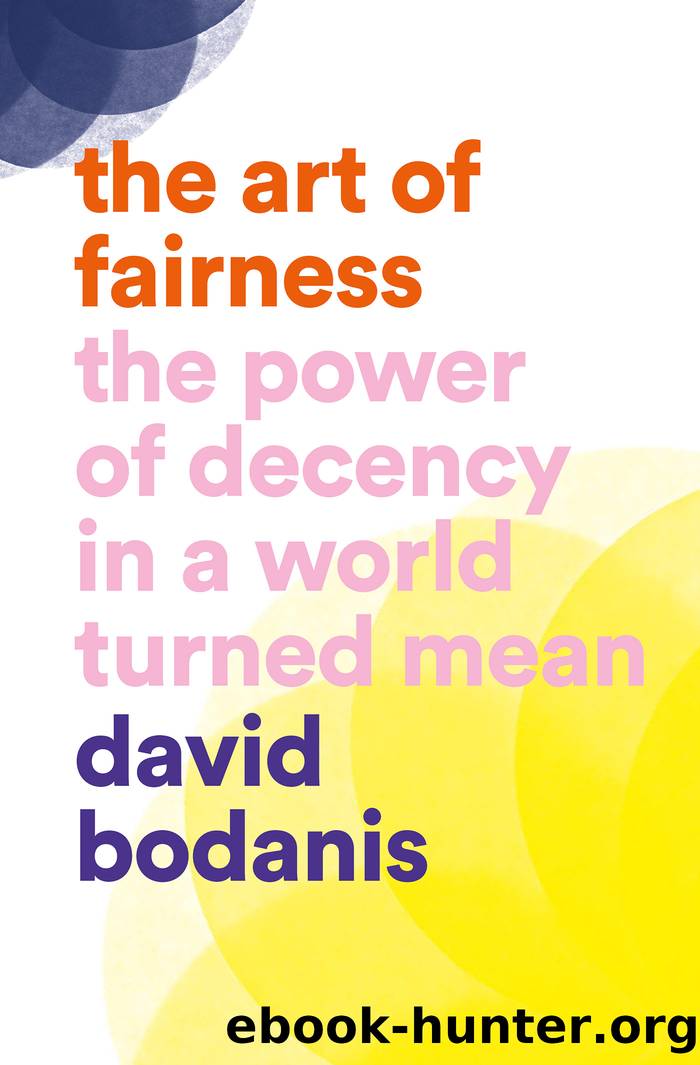The Art of Fairness by David Bodanis

Author:David Bodanis
Language: eng
Format: epub
Publisher: Abrams
Published: 2021-07-09T00:00:00+00:00
NOT GIVING, BUT UNDERMINING
Get rid of the âlyingâ press and you have one less constraint. Get rid of every institution that keeps the current government in powerâundermine the checks and balances in the Weimar Constitutionâand youâll be entirely free. Hitler needed that, and Goebbels, sharing that need, was his perfect instrument. This was the opposite of giving, and here too helps clarify the mechanism of its proper working from our first chapters.
The institutions Goebbels attacked wouldnât feel gratitude toward himâtheyâd resent himâbut that didnât matter. He didnât want their help. Instead, he wanted to break them into a series of isolated individuals, and so entirely at his whim.
A first target was the legislative branch of government, embodied in the parliament, or Reichstag. Much of the countryâs institutions had been designed by the famed sociologist Max Weber, a notable figure at Goebbelsâs old university of Heidelberg for many years. But how could an academic know anything? The legislature was incompetent, Goebbels and his agents insisted; it was slow and it was backward-looking, and it didnât deserve to be listened to.
The attacks began with the mocking nicknames, and then went further. The legislature was loaded with Deserters, obviously, and no doubt with Jews, and if there were legislators who were neither Social Democrats nor Jews, yet still disagreed with Nazi policyâwell, who was to say they werenât secretly controlled by the forces of international finance, which everyone knewâfor Goebbels had informed the nation of this many timesâwas basically Jewish? The fact that most of the main banks in Britain and France and America snobbishly kept Jews out (and in Britain and America often excluded Catholics too, for that matter) was not going to be brought to anyoneâs attention.
Just as the press could be undermined by pretending they werenât merely wrong, but malicious, Goebbels didnât say the country was following a misled democracy, or an inefficient democracy, or a democracy that needed to be reformed. There was a better, more overwhelming term, and in his newspaper, Der Angriff, Goebbels underlined it. âWe oppose a fake democracy,â he proclaimed. Who would wish to be limited by the established rules of an institution that was fake? Populist voters like to think the establishment is just a charade. Nor, because it was fake, was there any chance his party would be corrupted once they got elected and joined the legislature. When it came to âthe marbled halls of parliament ⦠[W]e do not want to join this pile of shit. We are coming to shovel it out.â
Slamming opponents in the judiciary was important too. Even when Nazi representatives began to enter the Reichstag, a few judges who respected the Weimar Constitution tried to block the worst of their acts. Goebbels turned the full force of his name-calling and public derision on them. He knew that the weak points in any constitution are the people who have to enact it. Judges who insisted on fairness were taunted for being unpatriotic, andâeven if theyâd been born in Germany, even if their parents and grandparents had been born in Germanyâfor not being properly German.
Download
This site does not store any files on its server. We only index and link to content provided by other sites. Please contact the content providers to delete copyright contents if any and email us, we'll remove relevant links or contents immediately.
The Ten Equations That Rule the World by David Sumpter(522)
Improvise! by Max Dickins(521)
Decisions, Decisions How to Get Off the Fence and Choose What’s Best—for You! by RANDY W. GREEN(493)
The Art of Fairness by David Bodanis(491)
Dean Graziosi-Millionaire Success Habits-Dean Graziosi (2016) by Unknown Author(478)
Perfecting Your Pitch by Ronald M. Shapiro(400)
The F.I.R.E. Planner by Michael Quan(400)
Good Boss, Bad Boss by Robert I. Sutton(376)
Big Boys' Rules by Mark Urban(370)
The Power of 3 by Robb Hiller(369)
Master the Game of Money by Robbin Kelly(350)
The Three Signs of a Miserable Job by Patrick M. Lencioni(346)
Napoleon Hill's Golden Rules by Napoleon Hill(345)
Meetings With Remarkable Men by G.I. Gurdjieff(337)
Crush Your Career by Dee Ann Turner(334)
Napoleon Hill's Keys to Success by Napoleon Hill(332)
Direct Selling by unknow(322)
Train (Your Brain) Like an Olympian: Gold Medal Techniques to Unleash Your Potential at Work by Jean François Ménard & Marie Malchelosse(302)
The 4 Laws of Financial Prosperity: Get Control of Your Money Now! by Blaine Harris & Charles Coonradt(299)
